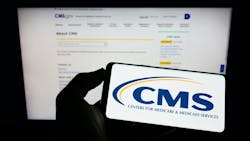CMS Rule Seeks to Address Accrediting Organization Conflicts of Interest
The Centers for Medicare & Medicaid Services has proposed a rule to bolster its oversight of accrediting organizations (AOs). Among other things, the rule seeks to address potential conflicts of interest by placing limitations on the fee-based consulting services AOs provide to the healthcare facilities they accredit.
Each year, accrediting organizations (AOs) with a CMS-approved program survey over 9,000 accredited healthcare providers and suppliers participating in the Medicare/Medicaid program for compliance with health and safety requirements.
CMS said that in recent years it has identified several concerns related to AO performance:
• Providers and suppliers that have been terminated from the Medicare/Medicaid program but retain accreditation despite significant quality and safety concerns;
• AOs provide fee-based consulting services to the providers and suppliers they accredit, potentially affecting the integrity of the onsite survey process and decreasing public trust by creating conflicts of interest;
• Inconsistent survey results due to differing AO standards or practices (such as AOs notifying facilities of the date of their onsite surveys in advance contrary to CMS policies).
The proposed changes seek to strengthen oversight of AOs, reduce conflicts of interest, and strive for enhanced consistency of survey processes. Here is a summary:
• Holding AOs accountable to the same standards as State Survey Agencies that also conduct surveys on behalf of CMS.
• Ensuring that AOs remain independent reviewers by addressing conflicts of interest and placing certain limitations on the fee-based consulting services AOs provide to the healthcare facilities they accredit.
• Preventing AO conflicts of interest by prohibiting AO owners, surveyors, and other employees, and as well as their immediate family members that have an interest in or relationship with a health care facility accredited by the AO from participating in surveys, having input into the survey results and involvement in pre- or post-survey activities of that facility, or from having access to survey records related to that facility.
• Addressing potential and actual conflicts of interest by requiring AOs to report specific information to CMS about how they will monitor, prevent, and handle conflicts of interest and fee-based consulting services they provide.
• Improving AO performance by requiring AOs with poor performance to submit a publicly reported correction plan to CMS.
• Improving consistency and standardization in surveys nationwide by more closely aligning AO survey activity requirements and staff training with those of SAs.
Currently, CMS has approved nine AOs to survey and accredit Medicare-certified facilities, including The Joint Commission, URAC and the National Association of Boards of Pharmacy.
Responding to the proposed rule, Shawn Griffin, M.D., CEO and president of URAC, issued a statement: “As the nation’s most complete healthcare accreditation organization, URAC strongly supports the new rule from CMS that most notably addresses conflicts of interest in accrediting organizations. URAC prides itself on not offering consulting services, which can be a conflict of interest because it’s like giving an organization seeking accreditation the answers to the ‘test,’ defeating the purpose of accreditation being a rigorous test of quality. While we do work closely with the organizations seeking accreditation, we are careful not to have any conflicts of interest in the process. We believe this new rule will improve the quality of healthcare by ensuring organizations are implementing best practices and quality standards on their own accord, before receiving the ‘gold star’ of accreditation.”
The changes outlined in the NPRM affect all AOs except those that accredit clinical laboratories and noncertified suppliers, which include suppliers of advanced diagnostic imaging (ADI), home infusion therapy (HIT), and diabetes self-management training (DSMT), as well as durable medical equipment (DME) suppliers and suppliers of durable medical equipment prosthetics, orthotics, and supplies (DMEPOS).


